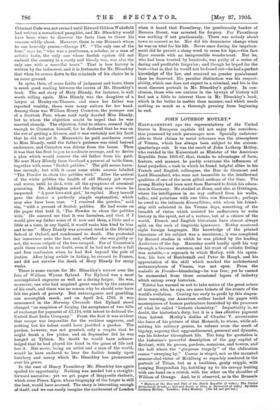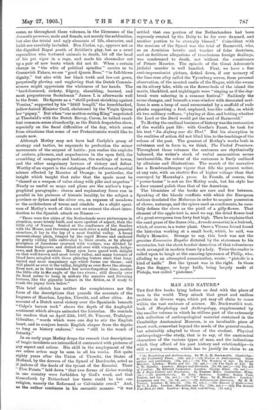JOHN LOTHROP MOTLEY.*
HALF-A-CENTURY ago the representatives of the United States in European capitals did not enjoy the considera- tion possessed by such personages now. Specially unfavour- able to their claims to social tolerance was the atmosphere of Vienna, which has always been subject to the sixteen- quarterings rule. It was the merit of John Lothrop Motley, who resided in the Kaiserstadt as Minister of the American Republic from 1861-67, that,- thanks to advantages of form, feature, and manner, he partly overcame the influences of local prejudice, a task in which he found helpful allies in his French and English colleagues, the Due de Gramont and Lord Bloomfield, who were not insensible to the intellectual qualities of one of the most gifted authors of the time. The young Motley had been sent from Harvard to finish his educa- tion in Germany. He studied at Bonn, and also at Gottingen, where his intelligence in no way suffered from his walks, talks, and potations with one Otto von Bismarck ; perhaps be owed to the intimate Kommilit one, with whom his friend- ship still subsisted in his Vienna days, something of the breadth of vision which assisted his endeavours to write history in the spirit, not of a recluse, but of a citizen of the world. French and English historians have almost always split on the rock of linguistic ignorance. Motley mastered eight foreign languages. His knowledge of the printed literature of his subject was a maximum ; it was completed by Record studies in which he was piloted by the leading Archivists of the day. Macaulay could hardly spell his way through a German sentence, and his want of artistic feeling was notable,—a reproach to which Motley, with his opera- box, his love of Rembrandt and Peter de Hoogh, and his appreciation of the skill which marked the architectural metamorphoses of Vienna, was not open. From the inaladie de Froude—blundering—he was free; yet he cannot be exonerated from those occasional lapses of industry which entrap every historian.
Tolstoi has warned us not to take notice of the great actors of history, who, he says, are mere tickets of the events of the world's evolution. Coming too early to profit by this stupen- dous warning, our American author loaded his pages with masterpieces of human portraiture furnished by the processes of what he called "historic chemistry." Impartiality is, no doubt, the historian's duty, but it is a less effective pigment than hatred. Motley's dislike of Charles V. accentuates the force of his picture of that Monarch, to whom, while ad- mitting his military genius, he refuses even the merit of bigotry, arguing that aggrandisement, personal and dynastic, was his lodestar throughout life. Too long for quotation is the historian's powerful description of the gay capital of Brabant, with its groves, gardens, mansions, and towers, and the hall where the "gorgeous tragedy" of the abdication comes "sweeping by." Caesar is staged, not as the mounted armour-clad victor of Miihlberg so superbly rendered in the portrait of Titian, but as a toothless, gouty cripple, with hanging Burgundian lip, hobbling up to his canopy leaning with one hand on a crutch, with the other on the shoulder of William of Orange. And, be it observed, as in the Brussels
• History of the Rise and Fall of the Dutch Republic (3 vols.) ; The United Netherlands (4 vols.); We and Death of John of Barneoetd (2 vole.) BrJohn Lothrop Motley. London : John Murray. [10e. 64. net per vol.] scene, so throughout these volumes, in the likenesses of the dramatis personae, male and female, not merely the sublimities, but also the trivial and ugly elements of life, character, and habit are carefully included. Don Carlos, e.g., appears not as the dignified Royal youth of Sthiller's play, but as a cruel rapscallion who tortured animals to death, bit off the head of his pet viper in a rage, and made his shoemaker eat up a pair of new boots which did not fit. When a certain change in "the whiz of political spindles" carries us to Greenwich Palace, we see "good Queen Bess," "in full-blown dignity," but also with her black teeth and low-cut gown, perpetually gloving and ungloving that the Dutch Commis- sioners might appreciate the whiteness of her hands. The "hard-featured, rickety, fidgety, shambling, learned, and most preposterous Scotchman" James I. is afterwards well to the front. He figures as a "shrill pedant shrieking against
Vossius," supported by his " littill beagill," the hunchbacked, yellow-haired Minister Cecil, christened by the Virgin Queen her "pigmy." But when "our mutton-eating King" negotiated at Theobald's with the Dutch Envoy, Caron, he talked excel- lent common-sense abundantly, as the Dutch despatches show, especially on the fiscal difficulties of the day, which arose from situations that some of our Protectionists would like to create now.
Although Motley may not have had Carlyle's grasp of strategy and tactics, he expounds to perfection the minor movements of the serpent of battle : you realise the exploits of archers, pikemen, and arquebusiers in the open field, the crumbling of ramparts and bastions, the sackings of towns, and the other sanguinary horrors of victory and defeat.
Worthy of an expert is the catalogue of the reforms of martial science effected by Maurice of Orange : in particular, the insight which taught that ruler that the spade must be "classed as a weapon of value along with pike and arquebus." Nearly as useful as maps and plans are the author's topo- graphical paragraphs : charm and explanatory force run in parallel in his pictures of historic locality, be the subject a province or dykes and the silver sea, an expanse of meadows or the architecture of towns and citadels. As a slight speci- men of Motley's work of this sort we extract the short intro- duction to the Spanish attack on Namur :—
"There were few cities of the Netherlands more picturesque in situation, more trimly built, and more opulent of aspect, than the little city of Namur. Seated at the confluence of the Sambre with the Meuse, and throwing over each river a solid but graceful structure, it lay in the lap of a most fruitful valley. A broad crescent-shape plain, fringed by the rapid Meuse and enclosed by gently rolling hills cultivated to their crests, or by abrupt precipices of limestone crowned with verdure, was divided by numerous hedgerows and dotted all over with vineyards, hedge- rows, and flower gardens Many eyes have gazed with delight on that well-known and most lovely valley, and many torrents of blood have mingled with those glancing waters since that long- buried and most sanguinary age which forms our theme; and still placid as ever is the valley, brightly as ever flows the stream. Even now, as in that vanished but never-forgotten time, nestles the little city in the angle of the two rivers ; still directly over its head seems to hang in mid-air the massive and frowning fortress, like the gigantic -helmet in the fiction, as if ready to crush the pigmy town below."
This brief sketch has neither the completeness nor the force of the descriptions that precede the accounts of the leaguers of Haarlem, Leyden, Utrecht, and other cities. An account of a Dutch naval victory over the Spaniards beneath " Calpe's barren rock" shows the depth of the Anglophil sentiment which always animated the historian. He reminds his readers that on April 25th, 1607, St. Vincent, Trafalgar, Gibraltar, "words which were one day to stir the English heart, and to conjure heroic English shapes from the depths so long as history endures," were "still in the womb of futurity."
In an early page Motley drops the remark that descriptions of tragic incidents are intensified if contrasted with pictures of
gay aspect and colour. His skill in the employment of the are celare artem may be seen in all his works. Not quite eighty years after the Union of Utrecht, the States of Holland, by the decrees of the Synod of Dordrecht, acted as if jealous of the deeds of the tyrant of the Escorial. Their .` Five Points" laid down "that two forms of divine worship
m one country were forbidden by God's word, and that thenceforth by Netherland law there could be but one religion, namely the Reformed or Calvinistic creed." And, settled that one portion of the Netherlanders had been expressly created by the Deity to be for ever damned, and another portion to be eternally blessed." Coincident with the sessions of the Synod was the trial of Barneveld, who, as an Arminian heretic and teacher of false doctrines, and on fictitious allegations of treacherous foreign dealings, was condemned to death, not without the connivance of Prince Maurice. The episode of the Great Advocate's judicial murder is well handled. First, we have a fine anti-impressionist picture, dotted down, if our memory of the lime-tree alley called the Vyverberg serves, from personal observation, of the moated castle of the Hague, with the swans on its silvery lake, while on the flower-beds of the island the mauls, blackbird, and nightingale were "singing as if the day- break were ushering in a summer festival." Suddenly the scene changes, and beneath a rose-window with decorated mul- lions is seen a heap of sand surmounted by a scaffold of rude planks supporting a foul, unplaned, box-like coffin, on which sit two military ruffians, "playing at dice, and betting whether the Lord or the Devil would get the soul of Barneveld."
To Motley the cardinal business of history was the restoration of the world's past life : with Goethe's Faust, he took for his text "Isa Anfang war die That." But his absorption in the realities of action did not blind him to the teachings of the echoes of the past. The greatest of Motley's works both in substance and in form is, we think, The United Provinces. Throughout these volumes the sentences are rhythmically balanced, the writer's stock of verbal ammunition seems inexhaustible, the colour of the sentences is finely outlined by allusions and illustrations. The march of the narrative has a Rembrandtesque vigour that fills the present writer, at any rate, with an electric flux of higher voltage than that conveyed by Macaulay's prose. In Froude, of course, the " power-house " is not on the Motley scale, but his style has a finer enamel polish than that of the American.
The blemishes of the books are rare and few between. Speaking of the bloody conflicts with which the European nations desolated the Moluccas in order to acquire possession of cloves, nutmegs, and the spices used as condiments, he care- fully defines the clove as the pistil of a gilly-flower. That element of the apple-tart is, need we say, the dried flower-bud of a great evergreen tree forty feet high. Then he explains that the sand grass of the dunes (viz., Arundo arenaria) is a bulrush, which, of course, is a water plant. Once a Vienna friend found the historian working at a small book, which, be said, was Sully's' Memoirs. Strange to say, this book was not the genuine Economies Boyales dictated by the statesman to his secretaries, but the short boudoir decoction of that voluminous work arranged in modern times by a lady. Twice the reader is called upon to laugh at the amazing ignorance of Philip, who, alluding to an attempted assassination, wrote : " pistolle is a kind of knife." But the tyrant was in the right. In those days the dagger, or large knife, being largely made at Pistoja, was called " pistolese."







































 Previous page
Previous page